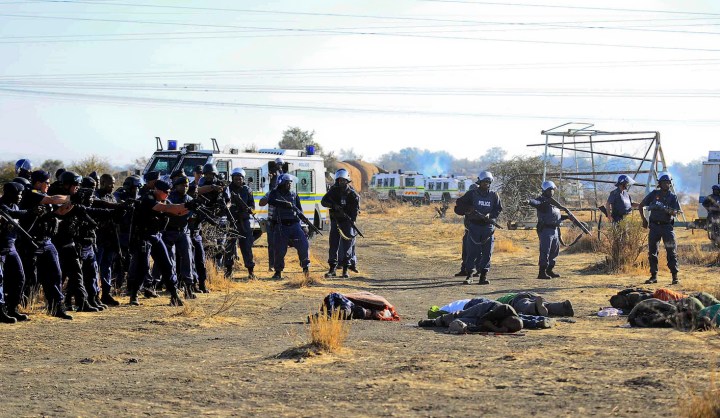South Africa
Notes from the House: De-escalation of violence key for public order policing

MPs were briefed this week about ways to ensure that when it comes to public policing, all remedies towards a peaceful resolution were exhausted before resorting to force. By MOIRA LEVY.
First published by Notes from the House
A Panel of Experts recommended by the Farlam Commission of Inquiry to examine police capacity to manage crowd control has proposed measures to “civilianise” and “demilitarise” the police force.
The panel, which was set up a year ago and brought in international and local experts on public policing, said its aim was to make sure that nothing like the Marikana massacre ever happened again. It stated in its report that after any “wrongful act” there is a duty to “cease the violation and to ensure that it does not happen again (and) repair the damage caused”.
Apart from the loss of life that resulted from the police killing of 34 striking miners the panel concluded that consequences of what it called the “violation” included a serious decline in general public confidence in the police and a breakdown of police-community relations.
The report called for the use of “less lethal weapons” saying that weapons capable of automatic fire should not be used to manage crowds.
The panel, which presented its report to the Portfolio Committee on Police earlier this week, singled out damage to future collective bargaining processes in the sector and said effective labour relations on the mines required recognition of multiple stakeholders.
The report expressed the panel’s concern over delays in the settling of compensation and the consequences for the entire community of the killings of family breadwinners.
“The seeming intransigence and tardiness of Lonmin and other mining companies in addressing the ongoing plight of mine workers and the continued injustices they and their dependents face remain a worrying concern,” the report stated.
The panel comprised members from the South African Police Service (SAPS) and representatives of their counterparts from Russia, Brazil and Zimbabwe. Cees de Rover from Holland was an independent member, as were local experts on policing.
The panel also cited collective bargaining as a potential cause of labour unrest and said there was a need to work with all stakeholders to defuse tension before the bargaining process erupted into violence. A danger emerged in liaising with only one trade union, even if had majority support.
The committee was addressed by a member of the panel, Eldred de Klerk, who represented the Africa Centre for Security and Intelligence Practice. He said the aim of police in situations of protest and crowd control was first and foremost the de-escalation of violence. Unless it was unavoidable, non-lethal means to restore order should be exhausted before resorting to the use of force, he said.
“Police have a duty to anticipate what can happen when they decide to take the final cause of action. And in doing that, they should seek to mitigate and get to de-escalate and avoid the potential for violence.
“De-escalation should be at the centre of any crowd management or public order operation; there is no other way to do it. You engage, you step back and you make sure that you de-escalate and not escalate the situation by the actions you take,” he said.
De Klerk told the panel that there is no dedicated training for officers involved in public order policing despite the prevalence of public protest. He pointed to a need for better training and possibly a skills audit within SAPS.
“Before any overt use of force; all remedies to bring any conflict, protest or disorder to a peaceful resolution need to be exhausted,” said de Klerk.
Lieutenant General Bonang Mgwenya, the Deputy National Commissioner: Human Resource Management, raised the need for public order policing mobile units, strengthening existing public order policing units and establishing additional public order policing units.
She said the Public Order Policing unit currently had 5,343 officers. A total of 1 258 posts were filled during the 2016/17 financial year, including 580 trainees.
On training, she said SAPs offered refresher course in crowd management and the course had been extended from two days to three weeks. More than 8,000 members from all provinces were trained during the 2016/17 financial year. The panel will submit its final report to Police Minister Fikile Mbalula. DM
Photo: Police check the bodies of striking mineworkers who were shot dead at the Wonderkop informal settlement in Marikana on 16 August 2012. Photo: EPA

















 Become an Insider
Become an Insider